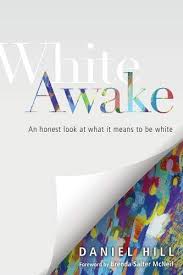This is not a hard-hitting book. I found it much more gentle than the other books on this topic that I've reviewed previously.
White Awake has a similar approach as White Fragility, by Robin DiAngelo. They both instruct the white person who is just beginning a racial awakening about the feelings they are about to experience, and how to navigate those. Indeed, White Awake often quotes White Fragility.
Whites who haven't had some initial shock, revelation, eye-opening, or disorienting experience just might not get much out of White Awake. I don't think you need to read White Fragility first, but reading that or How to be An Antiracist or Dispossession or something more hard-hitting first would be helpful for many whites.
Would this make a good Bible study? In the back of the book are a set of discussion questions for each chapter. Those certainly would be helpful for conversation starters, but there's really not a lot of scripture in this book. It's written to discuss what white Christians will be going through as they have their awakening, and it will help them as a guide through that journey. The book includes examples from scripture to illustrate many points. The author takes a culturally-aware biblical worldview throughout. I suppose you could say that the author uses scripture as the foundation for everything he has to say. But it's just not a Bible study, and that's okay. Maybe you don't need a lot of scripture to back up a very simple truth. We all need to read the Bible, but we need to read lots of other stuff as well.
There are good, sound theological points made in the book, and a significant one is in chapter 6. That one goes like this: Scripture is full of good advice, but if whites are blind to the plight of the black American, they'll probably also miss the point made in much of scripture, or at least underemphasize actions they should be taking, and overemphasize other stuff.
Don't let this ho-hum overview turn you off. I did get value out of reading this book. For example, I spotted my own behavior as "the annoying, self-righteous white guy [who had] finally seen the light, and [was] determined to make everyone around me see it." (pg 11.) Daniel explains that this is bound to happen, but that we should strive to avoid it by being self-aware. Something I've heard in some of the books I've read, including this one, is a warning about coming across as a paternalistic rich white guy, coming to save the poor brown people (pg 15). I need to hear that over and over.
One point in this book not in any of the others is this: given the racial history in most of America, very few black people will attend a church with a white pastor, so there is no point in making integration the #1 goal or 1st step (p16). We enlightened whites immediately want to go into action, but that action is almost always misguided (p19, 105-106). Rather, our vision is likely still blurry. Let's just focus on making sure we can see (p21, 153-155, 162-165). Keep doing that. Never stop. Not only are do we whites not have the right answers, but we also don't even know how to ask the right questions yet, generally speaking of course (p23).
There are some really great stories in White Awake. There were at least two that really woke me up. They were about how whites respond to blacks when their racial hackles are raised, and I could see myself giving the wrong kind of response.
Chapter 3 gives a great explanation of why trying to be "color-blind", or color neutral, seeing everyone in the same way, is a very bad strategy, and un-biblical.
The author's recommendation for us whites is to engage in self-reflection and expose ourselves to perspectives outside our comfort level (p45). Among other recommendations is to get close to suffering (p165-172) and put yourself under the leadership of people of color (p172-173).
There were a couple things in this book I didn't agree with, but they are of no consequence. The author pretty much goes on to say that even if you disagree with that point, it's just one example of many and you can't deny the preponderance of the evidence.
In one place (p61) the author states that "assigning value to human beings… is a sin of the highest order." I don't know what he means by "highest order". Aren't all sins (except denying Christ) the same in God's eyes? The sin of the highest order is denying Christ. Perhaps this was a slip. The author, apparently protestant with a Pentecostal upbringing (p134), seems to have quite a bit of Catholic influence, so that remark gave me pause. I didn't notice any other issues with his theology, and even that one isn't a big deal.
1. Does the author handle scripture accurately? Yes
2. Does their teaching lead to a greater understanding of reconciliation, unity, and witness in the church? Yes
3. Does it spark greater love for Christ and others in me? Yes
4. Is it consistent with the gospel by pointing to Christ? Yes
5. Does a study or discussion guide accompany the book? Yes
In conclusion, I recommend White Awake to white Christians everywhere but note that White Awake would make a better book study than Bible study.

